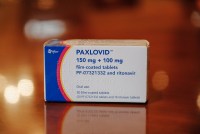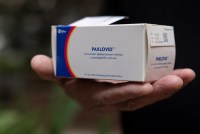Latest Morning Briefing Stories
What Older Americans Need to Know About Taking Paxlovid
Covid-19 continues to hit seniors with disproportionate severity. Experts say Paxlovid is an effective therapy that is being underprescribed for people 65 and older.
The Biggest, Buzziest Conference for Health Care Investors Convenes Amid Fears the Bubble Will Burst
This year’s JPMorgan confab, the first since covid’s chilling effect on such gatherings, was full of energy and enthusiasm. But it was also marked by questions about the future of health care investment.
California Attorney General Sues Drugmakers Over Inflated Insulin Prices
California Attorney General Rob Bonta is taking three major drugmakers and three distributors to court, alleging the companies illegally raised prices at the expense of diabetes patients.
What the Health? From KFF Health News: GOP House Opens With Abortion Agenda
Leaders of the new Republican-led U.S. House kicked off their legislative agenda with two bills supported by anti-abortion groups. While neither is likely to become law, the move demonstrates how abortion will continue to be an issue in Washington. Meanwhile, as open enrollment for the Affordable Care Act nears its end in most states, the number of Americans covered by the plans hits a new high. Margot Sanger-Katz of The New York Times, Alice Miranda Ollstein of Politico, and Sarah Karlin-Smith of the Pink Sheet join KHN’s Julie Rovner to discuss these topics and more. Plus, for extra credit, the panelists recommend their favorite health policy stories of the week they think you should read, too.
Fiscal general de California demanda a farmacéuticas por “inflar” los precios de la insulina
En la demanda, Rob Bonta argumentó que los precios se han disparado y que algunos pacientes se han visto obligados a racionar sus medicamentos o renunciar por completo a comprar insulina.
Behavioral Telehealth Loses Momentum Without a Regulatory Boost
As flexible treatment options spurred by the covid pandemic wane, patients relying on medications classified as controlled substances worry that without action to extend the loosened rules, it’ll be harder to get their meds.
NY requiere que doctores receten naloxona a algunos pacientes que toman analgésicos opioides
Aunque los titulares son por las muertes por sobredosis de drogas ilícitas vendidas en la calle, el riesgo de sufrirlas también es real para los pacientes que toman opioides recetados por sus médicos.
NY Docs Are Now Required to Prescribe Naloxone to Some Patients on Opioid Painkillers
This strategy — now in place in at least 10 states — is part of an effort to curb accidental opioid overdose deaths by patients who take these powerful medications.
Readers and Tweeters Chime In on Disability Rights and Drug Discounts
KHN gives readers a chance to comment on a recent batch of stories.
Is Legislation to Safeguard Americans Against Superbugs a Boondoggle or Breakthrough?
While supporters cheer the PASTEUR Act as an essential strategy to stem the rise of antibiotic-resistant pathogens, critics call it a multibillion-dollar giveaway to Big Pharma.
KHN’s ‘What the Health?’: Health Spending? Only Congress Knows
Top negotiators in Congress have agreed to a framework for government spending into next year, but there are details to iron out before a vote — such as the scheduled Medicare payment cuts that have providers worried. Also, the Biden administration reopens its program allowing Americans to request free covid-19 home tests, as hopes for pandemic preparedness measures from Congress dim. Rachel Cohrs of Stat, Alice Miranda Ollstein of Politico, and Rebecca Adams of KHN join KHN’s Mary Agnes Carey to discuss these topics and more. Plus, for extra credit, the panelists recommend their favorite health policy stories of the week they think you should read, too.
Estados desafían a Biden a que baje precios de medicamentos permitiendo importaciones desde Canadá
En Estados Unidos se pagan unos de los precios más altos del mundo por los productos farmacéuticos de marca. Los medicamentos son generalmente menos caros en el vecino Canadá, donde el gobierno controla los precios.
States Challenge Biden to Lower Drug Prices by Allowing Imports From Canada
Colorado has joined Florida, New Hampshire, and New Mexico in seeking federal permission to import prescription drugs from Canada. President Joe Biden endorsed the approach in his 2020 campaign but has yet to approve any state plan.
In Rural America, Deadly Costs of Opioids Outweigh the Dollars Tagged to Address Them
Some people say it’s reasonable for densely populated areas to receive more settlement funds, since they serve more of those affected. But others worry this overlooks rural communities disproportionately harmed by opioid addiction.
KHN’s ‘What the Health?’: Congress Races the Clock
Sen. Raphael Warnock’s re-election in Georgia will give Democrats a clear-cut Senate majority for the first time in nearly a decade. Meanwhile, the current Congress has only days left to tackle major unfinished business on the health agenda, including fending off scheduled pay cuts for doctors and other health providers in the Medicare program. Joanne Kenen of the Johns Hopkins Bloomberg School of Public Health and Politico, Anna Edney of Bloomberg News, and Sandhya Raman of CQ Roll Call join KHN’s Julie Rovner to discuss these topics and more. Plus, for extra credit, the panelists recommend their favorite health policy stories of the week they think you should read, too.
Paxlovid Has Been Free So Far. Next Year, Sticker Shock Awaits.
The government soon will stop paying for the covid drug that has proved to be the most effective at keeping patients alive and out of the hospital.
Employers Use Patient Assistance Programs to Offset Their Own Costs
Some insurers and employers are tapping into assistance programs meant for individual patients. The concern: Some costly drugs could be harder for patients to access.
Journalists Discuss Medicaid Rules, Opioid Settlement Funds, and the Public Health Workforce
KHN and California Healthline staff made the rounds on national and local media this week to discuss their stories. Here’s a collection of their appearances.
Para lanzar un nuevo fármaco al mercado, la Administración de Alimentos y Medicamentos (FDA) exige a las farmacéuticas estudios exhaustivos para demostrar su seguridad y eficacia. Conseguir que un medicamento salga al mercado unos meses antes, y con menos gastos de lo habitual, puede traducirse en beneficios millonarios para el fabricante.
The Business of Clinical Trials Is Booming. Private Equity Has Taken Notice.
Private equity-backed Headlands Research heralded its covid-19 vaccine trials as a chance to boost participation among diverse populations, then it shuttered multiple sites that conducted them.




















